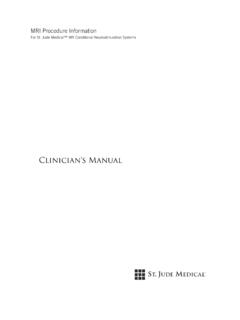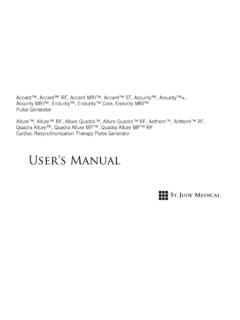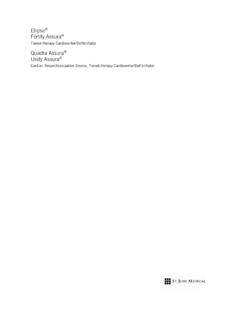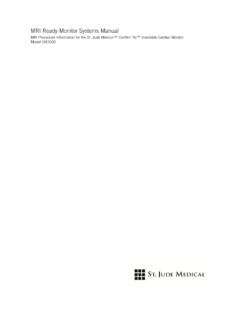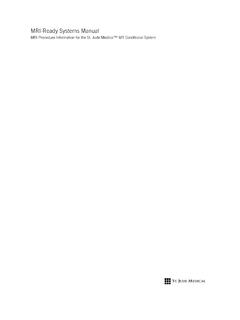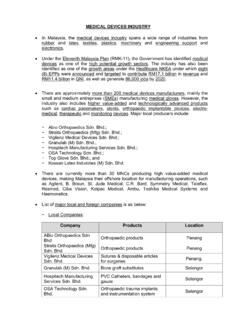Transcription of Allure™, Allure™ RF, Allure Quadra™, Allure Quadra™ RF ...
1 Accent , Accent RF, Accent MRI , Accent ST, Accent ST MRI, Assurity , Assurity +, Assurity MRI , Endurity , Endurity Core, Endurity MRI Pulse Generator Allure , Allure RF, Allure Quadra , Allure Quadra RF, Anthem , Anthem RF, Quadra Allure , Quadra Allure MP , Quadra Allure MP RF Cardiac Resynchronization Therapy Pulse Generator User's Manual Unless otherwise noted, indicates that the name is a trademark of, or licensed to, St. jude medical or one of its subsidiaries. ST. jude medical and the nine-squares symbol are trademarks and service marks of St. jude medical , Inc. and its related companies. Pat. 2016 St. jude medical , Inc. All Rights Reserved. Device Description This manual describes the St. jude medical pulse generators listed in the table below1. These devices can be programmed with Merlin Patient Care System equipped with Model 3330 version (or greater) software.
2 For information on programming, refer to the programmer's on-screen help. CAUTION: Not all device models are available in all all of the products listed as MR Conditional are approved for MR Conditional use in all countries or regions. Before performing an MRI scan on patients implanted with any of these devices, contact St. jude medical or consult your regulatory authorities to determine if the products have been certified as MR Conditional. Table 1. Pulse generator descriptions Name Model Number Description Connector Type MRI Status2 Accent SR PM1110 Single-chamber pulse generator IS-1 Untested Accent ST PM1122 Single-chamber pulse generator IS-1 Untested Accent MRI PM1124 Single-chamber pulse generator IS-1 MR Conditional 1 Not all device models are available in all countries. 2 As defined by the American College of Radiology. 1 Table 1.
3 Pulse generator descriptions Name Model Number Description Connector Type MRI Status2 Accent ST MRI PM1126 Single-chamber pulse generator IS-1 MR Conditional Endurity Core PM1140 Single-chamber pulse generator IS-1 MR Conditional Endurity Core PM1152 Single-chamber pulse generator IS-1 MR Conditional Endurity PM1160 Single-chamber pulse generator IS-1 Untested Endurity PM1162 Single-chamber pulse generator IS-1 MR Conditional Endurity MRI PM1172 Single-chamber pulse generator IS-1 MR Conditional Accent SR RF PM1210 Single-chamber pulse generator with RF telemetry IS-1 Untested Accent ST PM1222 Single-chamber pulse generator with RF telemetry IS-1 Untested Accent MRI PM1224 Single-chamber pulse generator with RF telemetry IS-1 MR Conditional 2 Table 1. Pulse generator descriptions Name Model Number Description Connector Type MRI Status2 Accent ST MRI PM1226 Single-chamber pulse generator with RF telemetry IS-1 MR Conditional Assurity PM1240 Single-chamber pulse generator with RF telemetry IS-1 Untested Assurity+ PM1260 Single-chamber pulse generator with RF telemetry IS-1 Untested Assurity MRI PM1272 Single-chamber pulse generator with RF telemetry IS-1 MR Conditional Accent DR PM2112 Dual-chamber pulse generator IS-1 Untested Accent ST PM2122 Dual-chamber pulse generator IS-1 Untested Accent MRI PM2124 Dual-chamber pulse generator IS-1 MR Conditional Accent ST MRI PM2126 Dual-chamber pulse generator IS-1 MR Conditional Endurity Core PM2140 Dual-chamber pulse generator IS-1 MR Conditional 3 Table 1.
4 Pulse generator descriptions Name Model Number Description Connector Type MRI Status2 Endurity Core PM2152 Dual-chamber pulse generator IS-1 MR Conditional Endurity PM2160 Dual-chamber pulse generator IS-1 Untested Endurity PM2162 Dual-chamber pulse generator IS-1 MR Conditional Endurity MRI PM2172 Dual-chamber pulse generator IS-1 MR Conditional Accent DR RF PM2212 Dual-chamber pulse generator with RF telemetry IS-1 Untested Accent ST PM2222 Dual-chamber pulse generator with RF telemetry IS-1 Untested Accent MRI PM2224 Dual-chamber pulse generator with RF telemetry IS-1 MR Conditional Accent ST MRI PM2226 Dual-chamber pulse generator with RF telemetry IS-1 MR Conditional Assurity PM2240 Dual-chamber pulse generator with RF telemetry IS-1 Untested 4 Table 1. Pulse generator descriptions Name Model Number Description Connector Type MRI Status2 Assurity+ PM2260 Dual-chamber pulse generator with RF telemetry IS-1 Untested Assurity MRI PM2272 Dual-chamber pulse generator with RF telemetry IS-1 MR Conditional Anthem PM3112 CRT-P IS-1 Untested Allure PM3120 CRT-P IS-1 Untested Allure Quadra PM3140 CRT-P IS-1/IS4-LLLL Untested Quadra Allure PM3542 CRT-P IS-1/IS4-LLLL MR Conditional Quadra Allure MP PM3160 CRT-P IS-1/IS4-LLLL Untested Quadra Allure MP PM3562 CRT-P IS-1/IS4-LLLL MR Conditional 5 Table 1.
5 Pulse generator descriptions Name Model Number Description Connector Type MRI Status2 Anthem RF PM3212 CRT-P with RF telemetry IS-1 Untested Allure RF PM3222 CRT-P with RF telemetry IS-1 Untested Allure Quadra RF PM3242 CRT-P with RF telemetry IS-1/IS4-LLLL Untested Quadra Allure MP RF PM3262 CRT-P with RF telemetry IS-1/IS4-LLLL Untested Indications Implantation of a single-chamber pulse generator, dual-chamber pulse generator, or CRT-P is indicated in one or more of the following permanent conditions: Syncope Presyncope Fatigue 6 Disorientation due to arrhythmia/bradycardia Or any combination of those symptoms. Implantation of a CRT-P is indicated for patients who: Would benefit from resynchronization of the right and left ventricles Have one or more conventional indications for the implantation of a pacemaker MR Conditional pulse generator is conditionally safe for use in the MRI environment when used in a complete MR Conditional pacing system and according to the instructions in the MRI Procedure Information document for the St.
6 jude medical MR Conditional Pacing System. Rate-modulated pacing is indicated for patients with chronotropic incompetence, and for those who would benefit from increased stimulation rates concurrent with physical activity. Chronotropic incompetence has not been rigorously defined. A conservative approach, supported by the literature, defines chronotropic incompetence as the failure to achieve an intrinsic heart rate of 70% of the age-predicted maximum heart rate or 120 min during exercise testing, whichever is less, where the age-predicted heart rate is calculated as 197 ( x age). Dual-chamber pacing (Dual-chamber pulse generators, CRT-Ps) is indicated for those patients exhibiting: Sick sinus syndrome Chronic, symptomatic second- and third-degree AV block Recurrent Adams-Stokes syndrome 7 Symptomatic bilateral bundle branch block when tachyarrhythmia and other causes have been ruled out.
7 Atrial pacing is indicated for patients with sinus node dysfunction and normal AV and intraventricular conduction systems. Ventricular pacing is indicated for patients with significant bradycardia and: Normal sinus rhythm with only rare episodes of A-V block or sinus arrest Chronic atrial fibrillation Severe physical disability. AF Suppression pacing (Dual-chamber pulse generators, CRT-Ps) is indicated for suppression of paroxysmal or persistent atrial fibrillation episodes in patients with one or more of the above pacing indications. AT/AF Detection Algorithm. The AT/AF detection algorithm is indicated for detecting atrial tachyarrhythmias which have been found to be associated with an increased risk of stroke in elderly, hypertensive, pacemaker patients without prior history of AF. For specific indications associated with individual modes, refer to the programmer's on-screen help.
8 Accessories, Intended Use Only the accessories listed here are approved for use with the pulse generators described in this manual. 8 Table 2. Accessories and their intended uses Accessory Intended use Torque driver To secure lead connectors and port plugs within the device header. IS-1 lead receptacle plug To insulate and protect unused lead receptacles. IS4/DF4 Port Plug Seal unused lead receptacles Contraindications Implanted Cardioverter-Defibrillator (ICD). Single-chamber pulse generators, dual-chamber pulse generators, and CRT-Ps are contraindicated in patients with an implanted cardioverter-defibrillator. Rate-Adaptive Pacing may be inappropriate for patients who experience angina or other symptoms of myocardial dysfunction at higher sensor-driven rates. An appropriate Maximum Sensor Rate should be selected based on assessment of the highest stimulation rate tolerated by the patient.
9 AF Suppression (Dual-chamber pulse generators, CRT-Ps) stimulation is not recommended in patients who cannot tolerate high atrial-rate stimulation. Dual-Chamber Pacing (Dual-chamber pulse generators, CRT-Ps), though not contraindicated for 9 patients with chronic atrial flutter, chronic atrial fibrillation, or silent atria, may provide no benefit beyond that of single-chamber pacing in such patients. Single-Chamber Ventricular Demand Pacing is relatively contraindicated in patients who have demonstrated pacemaker syndrome, have retrograde VA conduction, or suffer a drop in arterial blood pressure with the onset of ventricular pacing. Single-Chamber Atrial Pacing is relatively contraindicated in patients who have demonstrated compromise of AV conduction. For specific contraindications associated with individual modes, refer to the programmer's on-screen help. Warnings To prevent permanent damage to the device and tissue damage at the electrode/tissue interface: Electrosurgery.
10 Do not use electrosurgical devices in the vicinity of an implanted device. If electrocautery is necessary, use a bipolar cauterizer or place the indifferent electrode as far from the device as possible. Lithotripsy. Do not focus a lithotripsy beam within 16 cm of the device. Program the device to Sensor Off prior to lithotripsy to prevent inappropriate increases in pacing rate. A thorough assessment of device function with special attention to the sensor should be performed following exposure to lithotripsy. 10 Therapeutic Radiation. Do not use ionizing radiation in the vicinity of an implanted device. Radiation therapy may damage the electronic circuitry of the device. Ultrasound Treatment. Do not use therapeutic ultrasound within 16 cm of the device. Ventricular Sensing. In CRT-Ps, Ventricular Sensitivity should be programmed to the highest setting (lowest sensitivity) that will provide ventricular sensing with adequate sensing margin.
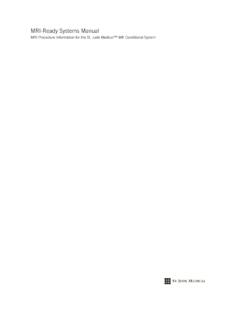
![Tendril STS 2088 [OUS] - St. Jude Medical Instructions for ...](/cache/preview/0/1/6/5/9/9/f/b/thumb-016599fbc524e50a7f361018615dac17.jpg)


